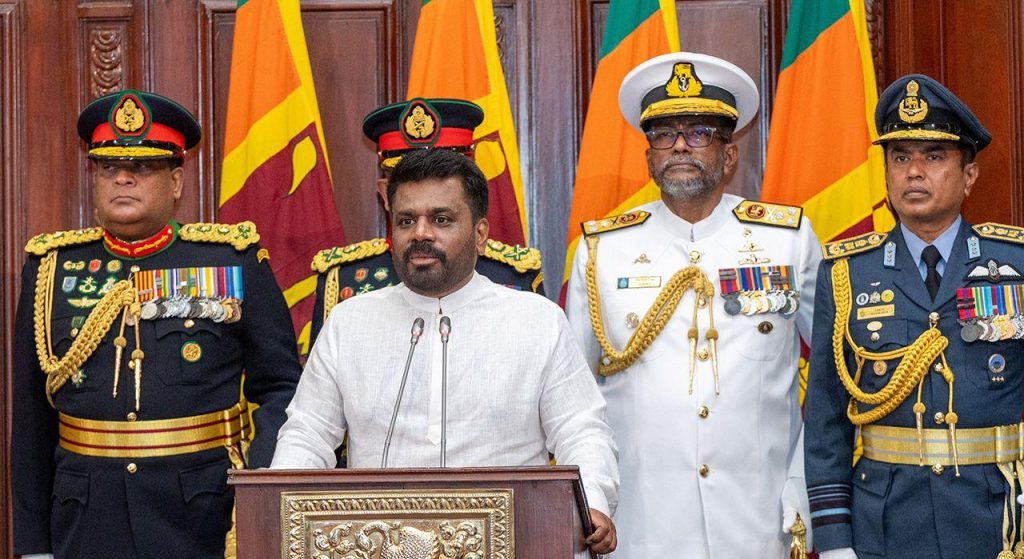
Sri Lanka has ushered in a new chapter with the swearing-in of President Anura Kumara Dissanayake, who is determined to implement “clean” politics as the nation navigates its recovery from a devastating economic crisis. Dissanayake, known for his left-leaning ideology, positions himself as a challenger to the entrenched political norms that have historically led to corruption and cronyism in the country.
His election marks the first significant political shift since 2022, a year that saw widespread protests driven by economic despair, ultimately forcing former President Gotabaya Rajapaksa to resign. Dissanayake’s message resonates deeply with citizens weary of systemic issues, emphasizing a break from the past.
In his inaugural address, the 55-year-old leader, often referred to as AKD, emphasized the importance of restoring faith in Sri Lankan democracy. “Democracy does not end with voting for a leader,” he declared, highlighting the need for a stronger democratic framework. “I pledge to safeguard democracy and work with those who possess the knowledge and skills necessary to uplift our country.”
Dissanayake concluded his speech with a Buddhist blessing, symbolizing inclusivity as representatives from Sri Lanka’s diverse religious communities—Islam, Hinduism, and Christianity—joined the ceremony. He remarked, “The unity of Sinhalese, Tamils, Muslims, and all Sri Lankans is the foundation of this new beginning.”
His campaign focused on promoting good governance and robust anti-corruption measures. Dissanayake aims to invigorate the manufacturing, agriculture, and IT sectors, and he has pledged to honor the agreement with the International Monetary Fund (IMF) that aims to stabilize the economy while protecting the most vulnerable from austerity measures.
Prior to Dissanayake’s swearing-in, Prime Minister Dinesh Gunawardena stepped down, paving the way for a potential parliamentary dissolution. In an interview with BBC Sinhala, Dissanayake expressed his intent to dissolve parliament, stating, “There is no point in continuing with a parliament that does not align with the people’s will.”
Dissanayake’s election victory was confirmed after a second round of counting, which was necessary as no candidate achieved the required majority in the first round. Ultimately, he secured 5,740,179 votes, defeating opposition leader Sajith Premadasa, who received 4,530,902 votes. The outgoing President Ranil Wickremesinghe garnered 2,299,767 votes and was eliminated in the first round.
Wickremesinghe congratulated Dissanayake, expressing his hope for the nation’s future. Until this election, every presidential vote since 1982 had resulted in a first-round winner, making this contest one of the most competitive in Sri Lankan history. Dissanayake’s anti-corruption message struck a chord with voters eager for change in the wake of the economic turmoil that led to widespread unrest.
Despite the historical baggage of his political party, the Marxist Janatha Vimukthi Peramuna (JVP), which had a violent past in the 1970s and 80s, Dissanayake’s platform gained traction. His alliance, the National People’s Power, emerged as a significant force during the protests known as the Aragalaya, or “struggle.”
As the new president, Dissanayake faces the formidable challenge of reviving an economy that has been devastated by mismanagement and external shocks, such as the COVID-19 pandemic. The previous administration had left the country with a staggering $83 billion in public debt and inflation soaring to 70%, rendering essential goods unaffordable for many.
Political analysts have noted that the ongoing economic crisis, characterized by dwindling foreign currency reserves and unsustainable debt levels, was a critical driver of public discontent. Dissanayake will need to navigate these complex issues carefully, balancing the demands for reform with the realities of economic recovery.
The new president’s immediate priorities include restructuring the nation’s debt—especially the $36 billion owed to foreign creditors, including $7 billion to China—while maintaining the necessary reforms tied to the IMF’s financial assistance.
Dissanayake and his rival Premadasa both advocate for enhancing IT development and establishing new industrial zones to bolster the economy. As the nation looks toward recovery, the focus remains on rebuilding trust and ensuring that the needs of all Sri Lankans are met in this pivotal moment of change.








